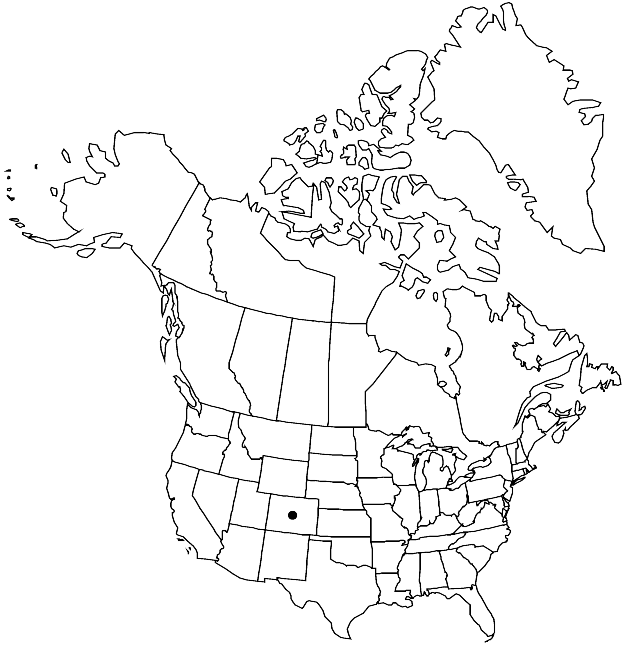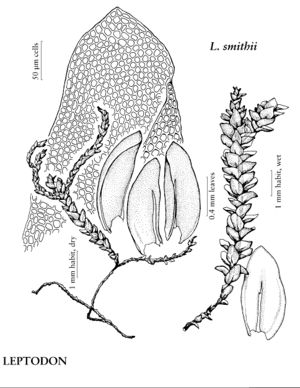Difference between revisions of "Leptodon smithii"
Index Mus. Pl. Crypt., [ 3]. 1803.
FNA>Volume Importer |
FNA>Volume Importer |
||
| Line 29: | Line 29: | ||
|elevation=high elevations | |elevation=high elevations | ||
|distribution=Colo.;South America;Eurasia;Africa;Pacific Islands (New Zealand);Australia. | |distribution=Colo.;South America;Eurasia;Africa;Pacific Islands (New Zealand);Australia. | ||
| − | |discussion=<p>Leptodon smithii in North America is known from a single locality in Jefferson County, collected by Nelson in 1971, and subsequently recollected in 1972 (P. P. Nelson 1973). The absence of inflorescences, weakly developed circinate stems, infrequent and 1-seriate paraphyllia, decurrent leaves, and broadly acute leaf apices question the assignment of the Colorado material to L. smithii. However, many of these tendencies can be found in specimens of L. smithii from Chile, and the lack of inflorescences in the Colorado material may indicate that these are immature plants. Alternatively, the Colorado material may be male plants of L. smithii that are more slender in habit than female plants (Nelson).</p> | + | |discussion=<p><i>Leptodon smithii</i> in North America is known from a single locality in Jefferson County, collected by Nelson in 1971, and subsequently recollected in 1972 (P. P. Nelson 1973). The absence of inflorescences, weakly developed circinate stems, infrequent and 1-seriate paraphyllia, decurrent leaves, and broadly acute leaf apices question the assignment of the Colorado material to <i>L. smithii</i>. However, many of these tendencies can be found in specimens of <i>L. smithii</i> from Chile, and the lack of inflorescences in the Colorado material may indicate that these are immature plants. Alternatively, the Colorado material may be male plants of <i>L. smithii</i> that are more slender in habit than female plants (Nelson).</p> |
|tables= | |tables= | ||
|references={{Treatment/Reference | |references={{Treatment/Reference | ||
| Line 55: | Line 55: | ||
|publication year=1803 | |publication year=1803 | ||
|special status=Selected by author to be illustrated | |special status=Selected by author to be illustrated | ||
| − | |source xml=https://jpend@bitbucket.org/aafc-mbb/fna-data-curation.git/src/ | + | |source xml=https://jpend@bitbucket.org/aafc-mbb/fna-data-curation.git/src/8f726806613d60c220dc4493de13607dd3150896/coarse_grained_fna_xml/V28/V28_984.xml |
|genus=Leptodon | |genus=Leptodon | ||
|species=Leptodon smithii | |species=Leptodon smithii | ||
Revision as of 18:09, 18 September 2019
Secondary stems not circinate. Stem and branch leaves 0.5–1 × 0.3–0.7 mm; base decurrent; medial laminal cells 8–12 × 6–12 µm. Inflorescences and sporophytes unknown.
Habitat: Epiphytic on rock
Elevation: high elevations
Distribution

Colo., South America, Eurasia, Africa, Pacific Islands (New Zealand), Australia.
Discussion
Leptodon smithii in North America is known from a single locality in Jefferson County, collected by Nelson in 1971, and subsequently recollected in 1972 (P. P. Nelson 1973). The absence of inflorescences, weakly developed circinate stems, infrequent and 1-seriate paraphyllia, decurrent leaves, and broadly acute leaf apices question the assignment of the Colorado material to L. smithii. However, many of these tendencies can be found in specimens of L. smithii from Chile, and the lack of inflorescences in the Colorado material may indicate that these are immature plants. Alternatively, the Colorado material may be male plants of L. smithii that are more slender in habit than female plants (Nelson).
